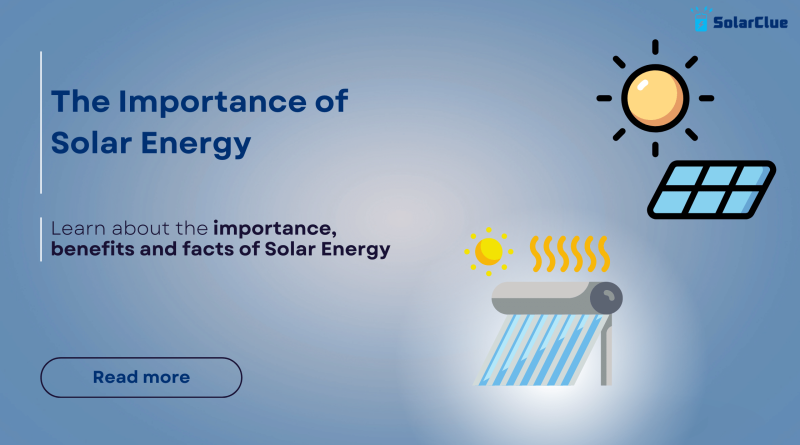Importance of Solar Energy: Benefits, Uses, and Facts
Solar energy emerges as a beacon of hope in a world grappling with environmental concerns and the need for sustainable energy sources. Harnessing the sun’s energy, solar power offers many benefits, ranging from environmental conservation to economic savings. In this blog lets look into the importance of solar energy, its advantages, and some intriguing facts surrounding this renewable resource.
Table of Contents
What is Solar Energy?
Solar energy refers to the radiant energy emitted by the sun, which is harnessed through solar panels to produce electricity or heat. It is a natural, sustainable, and renewable energy source readily available on our planet. Our ancestors recognized its potential, utilizing it in various forms even in ancient times. Solar energy holds immense promise today as a clean and abundant energy source.
Benefits of Solar Energy
- Environmental Sustainability: Solar energy is eco-friendly, emitting zero carbon dioxide during operation, thus mitigating pollution levels and combating climate change.
- Renewable and Affordable: Solar energy is an inexhaustible renewable resource that can replace non-renewable energy sources. Additionally, it offers a cost-effective alternative to traditional power generation methods.
- Accessible in Rural Areas: Solar energy empowers rural communities by providing access to electricity for household tasks, thereby enhancing quality of life and economic opportunities.
- Reliable and Diverse Uses: Solar energy is versatile and a reliable source for various applications, such as cooking, lighting, transportation, and industrial processes.
Importance of Solar Energy
1. Industrial Applications
Industries benefit from solar energy by installing solar power system on their roofs to power heavy machinery and protect infrastructure from corrosion. Solar energy contributes to cost savings and environmental preservation by reducing electricity consumption.
2. Battery Charging
Solar energy offers a sustainable solution for charging batteries, ensuring uninterrupted power supply during emergencies or power cuts. This reduces reliance on conventional electricity and saves on energy costs.
3. Solar Water Heating Systems
Solar water heaters provide an eco-friendly alternative to conventional water heating methods. Active and passive systems utilize solar collectors to heat water, offering efficient and affordable solutions for homes and businesses.
Facts about Solar Energy
- The first solar panel cell was invented in 1941, marking the beginning of solar energy technology.
- Solar panels can generate power even in indirect sunlight, showcasing their efficiency and versatility.
- A solar-powered home can reduce carbon dioxide emissions by 100 tonnes over 30 years, contributing significantly to environmental conservation.
Conclusion
In conclusion, solar energy is a beacon of sustainability and innovation in seeking clean and renewable energy sources. With its myriad benefits, diverse applications, and remarkable technological advancements, solar power holds the key to a brighter and greener future for future generations. Let us embrace the sun’s power and harness its boundless energy to create a more sustainable world.
Discover the power of solar energy with SolarClue, your trusted guide to the right solar products. From solar water heaters to heat pumps and solar power systems, SolarClue provides personalized guidance to meet your needs. With top-quality products and expert support, SolarClue makes embracing solar energy effortless. Join us on the journey to a sustainable future with SolarClue by your side.




